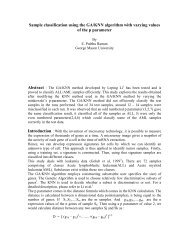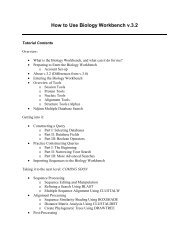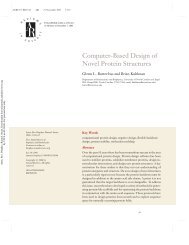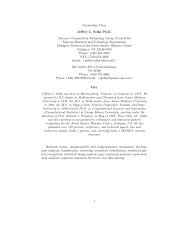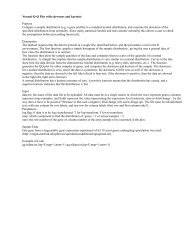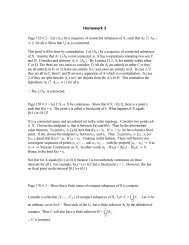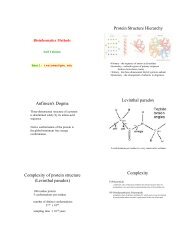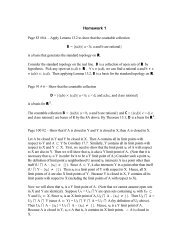- Page 1 and 2:
HP Fortran Programmer’s Reference
- Page 3:
Notice Copyright 1979-2003 Hewlett-
- Page 6 and 7:
Contents vi Structurecomponent ....
- Page 8 and 9:
Contents viii INTENTattribute......
- Page 10 and 11:
Contents x ASSIGN .................
- Page 12 and 13:
Contents xii RECORD (extension) ...
- Page 14 and 15:
Contents xiv CSHIFT(ARRAY,SHIFT,DIM
- Page 16 and 17:
Contents xvi LOC(X)................
- Page 18 and 19:
Contents xviii TRANSPOSE(MATRIX)...
- Page 20 and 21:
Tables Table9-10.D,E,F,andGeditdesc
- Page 22 and 23:
The HP Fortran Programmer’s Refer
- Page 24 and 25:
Notational conventions This section
- Page 26 and 27:
xxvi Either a or b must be supplied
- Page 28 and 29:
NOTE Many of these documents are ac
- Page 30 and 31:
Introduction to HP Fortran 2 Data t
- Page 32 and 33:
Introduction to HP Fortran HP Fortr
- Page 34 and 35:
Introduction to HP Fortran HP Fortr
- Page 36 and 37:
Language elements 8 Lexical tokens
- Page 38 and 39:
Language elements Lexical tokens Le
- Page 40 and 41:
Language elements Program structure
- Page 42 and 43:
Language elements Statements Statem
- Page 44 and 45:
Language elements Source format of
- Page 46 and 47:
Language elements Source format of
- Page 48 and 49:
Language elements Source format of
- Page 50 and 51:
Language elements INCLUDE line 22 C
- Page 52 and 53:
Data types and data objects 24 Deri
- Page 54 and 55:
Data types and data objects Intrins
- Page 56 and 57:
Data types and data objects Intrins
- Page 58 and 59:
Data types and data objects Intrins
- Page 60 and 61:
Data types and data objects Intrins
- Page 62 and 63:
Data types and data objects Intrins
- Page 64 and 65:
Data types and data objects Intrins
- Page 66 and 67:
Data types and data objects Intrins
- Page 68 and 69:
Data types and data objects Intrins
- Page 70 and 71:
Data types and data objects Derived
- Page 72 and 73:
Data types and data objects Derived
- Page 74 and 75:
Data types and data objects Derived
- Page 76 and 77:
Data types and data objects Derived
- Page 78 and 79:
Data types and data objects Pointer
- Page 80 and 81:
Data types and data objects Pointer
- Page 82 and 83:
Arrays 54 Array declarations Array-
- Page 84 and 85:
Arrays Array fundamentals a(1,2) a(
- Page 86 and 87:
Arrays Array declarations For a giv
- Page 88 and 89:
Arrays Array declarations If a proc
- Page 90 and 91:
Arrays Array declarations Allocatab
- Page 92 and 93:
Arrays Array declarations subscript
- Page 94 and 95:
Arrays Array sections Array section
- Page 96 and 97:
Arrays Array sections ! The arrays
- Page 98 and 99:
Arrays Array-valued structure compo
- Page 100 and 101:
Arrays Array-valued structure compo
- Page 102 and 103:
Arrays Array constructors depends o
- Page 104 and 105:
Arrays Array expressions ! the effe
- Page 106 and 107:
Arrays Array-valued functions PROGR
- Page 108 and 109:
Arrays Array inquiry intrinsics 80
- Page 110 and 111:
Expressions and assignment 82 — O
- Page 112 and 113:
Expressions and assignment Expressi
- Page 114 and 115:
Expressions and assignment Expressi
- Page 116 and 117:
Expressions and assignment Expressi
- Page 118 and 119:
Expressions and assignment Expressi
- Page 120 and 121:
Expressions and assignment Expressi
- Page 122 and 123:
Expressions and assignment Expressi
- Page 124 and 125:
Expressions and assignment Assignme
- Page 126 and 127:
Expressions and assignment Assignme
- Page 128 and 129:
Expressions and assignment Assignme
- Page 130 and 131:
Expressions and assignment Assignme
- Page 132 and 133:
Execution control 104 Control const
- Page 134 and 135:
Execution control Control construct
- Page 136 and 137:
Execution control Control construct
- Page 138 and 139:
Execution control Control construct
- Page 140 and 141:
Execution control Control construct
- Page 142 and 143:
Execution control Flow control stat
- Page 144 and 145:
Execution control Flow control stat
- Page 146 and 147:
Execution control Flow control stat
- Page 148 and 149:
Execution control Flow control stat
- Page 150 and 151:
Program units and procedures 122 Te
- Page 152 and 153:
Program units and procedures Termin
- Page 154 and 155:
Program units and procedures Main p
- Page 156 and 157:
Program units and procedures Main p
- Page 158 and 159:
Program units and procedures Extern
- Page 160 and 161:
Program units and procedures Extern
- Page 162 and 163:
Program units and procedures Extern
- Page 164 and 165:
Program units and procedures Intern
- Page 166 and 167:
Program units and procedures Statem
- Page 168 and 169:
Program units and procedures Argume
- Page 170 and 171:
Program units and procedures Argume
- Page 172 and 173:
Program units and procedures Argume
- Page 174 and 175:
Program units and procedures Argume
- Page 176 and 177:
Program units and procedures Argume
- Page 178 and 179:
Program units and procedures Proced
- Page 180 and 181:
Program units and procedures Proced
- Page 182 and 183:
Program units and procedures Proced
- Page 184 and 185:
Program units and procedures Proced
- Page 186 and 187:
Program units and procedures Module
- Page 188 and 189:
Program units and procedures Module
- Page 190 and 191:
Program units and procedures Module
- Page 192 and 193:
Program units and procedures Module
- Page 194 and 195:
Program units and procedures Block
- Page 196 and 197:
Program units and procedures Block
- Page 198 and 199:
I/O and file handling 170 Files Con
- Page 200 and 201:
I/O and file handling Files Files A
- Page 202 and 203:
I/O and file handling Connecting a
- Page 204 and 205:
I/O and file handling Connecting a
- Page 206 and 207:
I/O and file handling File access m
- Page 208 and 209:
I/O and file handling File access m
- Page 210 and 211:
I/O and file handling File access m
- Page 212 and 213:
I/O and file handling Nonadvancing
- Page 214 and 215:
I/O and file handling I/O statement
- Page 216 and 217:
I/O and file handling Syntax of I/O
- Page 218 and 219:
I/O and file handling Syntax of I/O
- Page 220 and 221: I/O and file handling Syntax of I/O
- Page 222 and 223: I/O and file handling Example progr
- Page 224 and 225: I/O and file handling Example progr
- Page 226 and 227: I/O and file handling Example progr
- Page 228 and 229: I/O and file handling Example progr
- Page 230 and 231: I/O formatting transferring data be
- Page 232 and 233: I/O formatting Format specification
- Page 234 and 235: I/O formatting Edit descriptors Tab
- Page 236 and 237: I/O formatting Edit descriptors del
- Page 238 and 239: I/O formatting Edit descriptors A a
- Page 240 and 241: I/O formatting Edit descriptors Tab
- Page 242 and 243: I/O formatting Edit descriptors Tab
- Page 244 and 245: I/O formatting Edit descriptors 216
- Page 246 and 247: I/O formatting Edit descriptors Tab
- Page 248 and 249: I/O formatting Edit descriptors Qed
- Page 250 and 251: I/O formatting Edit descriptors Tab
- Page 252 and 253: I/O formatting Edit descriptors O (
- Page 254 and 255: I/O formatting Edit descriptors Inp
- Page 256 and 257: I/O formatting Edit descriptors [r
- Page 258 and 259: I/O formatting Embedded format spec
- Page 260 and 261: I/O formatting Format specification
- Page 262 and 263: HP Fortran statements The following
- Page 264 and 265: HP Fortran statements Attributes Ta
- Page 266 and 267: HP Fortran statements ACCEPT (exten
- Page 268 and 269: HP Fortran statements ALLOCATABLE (
- Page 272 and 273: HP Fortran statements ALLOCATE The
- Page 274 and 275: HP Fortran statements AUTOMATIC (ex
- Page 276 and 277: HP Fortran statements BACKSPACE BAC
- Page 278 and 279: HP Fortran statements BLOCK DATA BL
- Page 280 and 281: HP Fortran statements BUFFER IN (ex
- Page 282 and 283: HP Fortran statements BUFFER OUT (e
- Page 284 and 285: HP Fortran statements BYTE (extensi
- Page 286 and 287: HP Fortran statements CALL 4. Contr
- Page 288 and 289: HP Fortran statements CASE low: For
- Page 290 and 291: HP Fortran statements CHARACTER CHA
- Page 292 and 293: HP Fortran statements CHARACTER 264
- Page 294 and 295: HP Fortran statements CLOSE Descrip
- Page 296 and 297: HP Fortran statements COMMON COMMON
- Page 298 and 299: HP Fortran statements COMMON ! comm
- Page 300 and 301: HP Fortran statements COMPLEX Descr
- Page 302 and 303: HP Fortran statements CONTAINS CONT
- Page 304 and 305: HP Fortran statements CONTINUE CONT
- Page 306 and 307: HP Fortran statements CYCLE Related
- Page 308 and 309: HP Fortran statements DATA 280 Proc
- Page 310 and 311: HP Fortran statements DATA 282 “I
- Page 312 and 313: HP Fortran statements DEALLOCATE Ex
- Page 314 and 315: HP Fortran statements DECODE (exten
- Page 316 and 317: HP Fortran statements DIMENSION (st
- Page 318 and 319: HP Fortran statements DIMENSION (st
- Page 320 and 321:
HP Fortran statements DO DO Control
- Page 322 and 323:
HP Fortran statements DO DO i = 1,
- Page 324 and 325:
HP Fortran statements DOUBLE COMPLE
- Page 326 and 327:
HP Fortran statements DOUBLE PRECIS
- Page 328 and 329:
HP Fortran statements ELSE ELSE Pro
- Page 330 and 331:
HP Fortran statements ELSE IF Relat
- Page 332 and 333:
HP Fortran statements ENCODE (exten
- Page 334 and 335:
HP Fortran statements ENCODE (exten
- Page 336 and 337:
HP Fortran statements END Related s
- Page 338 and 339:
HP Fortran statements END (structur
- Page 340 and 341:
HP Fortran statements END TYPE END
- Page 342 and 343:
HP Fortran statements ENDFILE An en
- Page 344 and 345:
HP Fortran statements ENTRY 316 The
- Page 346 and 347:
HP Fortran statements ENTRY Here ar
- Page 348 and 349:
HP Fortran statements EQUIVALENCE T
- Page 350 and 351:
HP Fortran statements EQUIVALENCE C
- Page 352 and 353:
HP Fortran statements EXTERNAL (sta
- Page 354 and 355:
HP Fortran statements EXTERNAL (sta
- Page 356 and 357:
HP Fortran statements FORMAT Relate
- Page 358 and 359:
HP Fortran statements FUNCTION Desc
- Page 360 and 361:
HP Fortran statements GO TO (comput
- Page 362 and 363:
HP Fortran statements IF (arithmeti
- Page 364 and 365:
HP Fortran statements IF (logical)
- Page 366 and 367:
HP Fortran statements IMPLICIT The
- Page 368 and 369:
HP Fortran statements INCLUDE Examp
- Page 370 and 371:
HP Fortran statements INQUIRE Table
- Page 372 and 373:
HP Fortran statements INQUIRE Table
- Page 374 and 375:
HP Fortran statements INQUIRE Table
- Page 376 and 377:
HP Fortran statements INQUIRE Table
- Page 378 and 379:
HP Fortran statements INQUIRE Relat
- Page 380 and 381:
HP Fortran statements INTEGER Descr
- Page 382 and 383:
HP Fortran statements INTENT (state
- Page 384 and 385:
HP Fortran statements INTENT (state
- Page 386 and 387:
HP Fortran statements INTERFACE SUB
- Page 388 and 389:
HP Fortran statements INTRINSIC (st
- Page 390 and 391:
HP Fortran statements LOGICAL Descr
- Page 392 and 393:
HP Fortran statements MAP (extensio
- Page 394 and 395:
HP Fortran statements MODULE ... FU
- Page 396 and 397:
HP Fortran statements MODULE PROCED
- Page 398 and 399:
HP Fortran statements NAMELIST The
- Page 400 and 401:
HP Fortran statements NULLIFY Relat
- Page 402 and 403:
HP Fortran statements ON (extension
- Page 404 and 405:
HP Fortran statements OPEN OPEN Con
- Page 406 and 407:
HP Fortran statements OPEN FILE=cha
- Page 408 and 409:
HP Fortran statements OPEN Table 10
- Page 410 and 411:
HP Fortran statements OPTIONAL (sta
- Page 412 and 413:
HP Fortran statements OPTIONAL (sta
- Page 414 and 415:
HP Fortran statements PARAMETER (st
- Page 416 and 417:
HP Fortran statements PARAMETER (st
- Page 418 and 419:
HP Fortran statements PAUSE ! Write
- Page 420 and 421:
HP Fortran statements POINTER (Cray
- Page 422 and 423:
HP Fortran statements POINTER (stat
- Page 424 and 425:
HP Fortran statements POINTER (stat
- Page 426 and 427:
HP Fortran statements PRINT Formatt
- Page 428 and 429:
HP Fortran statements PRIVATE (stat
- Page 430 and 431:
HP Fortran statements PROGRAM PROGR
- Page 432 and 433:
HP Fortran statements PUBLIC (state
- Page 434 and 435:
HP Fortran statements READ READ Inp
- Page 436 and 437:
HP Fortran statements READ IOSTAT=i
- Page 438 and 439:
HP Fortran statements READ Namelist
- Page 440 and 441:
HP Fortran statements REAL Descript
- Page 442 and 443:
HP Fortran statements RECORD (exten
- Page 444 and 445:
HP Fortran statements RECORD (exten
- Page 446 and 447:
HP Fortran statements RETURN RETURN
- Page 448 and 449:
HP Fortran statements REWIND REWIND
- Page 450 and 451:
HP Fortran statements SAVE (stateme
- Page 452 and 453:
HP Fortran statements SAVE (stateme
- Page 454 and 455:
HP Fortran statements SEQUENCE SEQU
- Page 456 and 457:
HP Fortran statements STATIC (state
- Page 458 and 459:
HP Fortran statements STOP STOP Ter
- Page 460 and 461:
HP Fortran statements STRUCTURE (ex
- Page 462 and 463:
HP Fortran statements STRUCTURE (ex
- Page 464 and 465:
HP Fortran statements STRUCTURE (ex
- Page 466 and 467:
HP Fortran statements STRUCTURE (ex
- Page 468 and 469:
HP Fortran statements SUBROUTINE SU
- Page 470 and 471:
HP Fortran statements TARGET (state
- Page 472 and 473:
HP Fortran statements TARGET (state
- Page 474 and 475:
HP Fortran statements TASK COMMON (
- Page 476 and 477:
HP Fortran statements TYPE (declara
- Page 478 and 479:
HP Fortran statements TYPE (definit
- Page 480 and 481:
HP Fortran statements TYPE (I/O) (e
- Page 482 and 483:
HP Fortran statements USE USE Provi
- Page 484 and 485:
HP Fortran statements VIRTUAL (exte
- Page 486 and 487:
HP Fortran statements WHERE (statem
- Page 488 and 489:
HP Fortran statements WHERE (statem
- Page 490 and 491:
HP Fortran statements WRITE WRITE O
- Page 492 and 493:
HP Fortran statements WRITE Descrip
- Page 494 and 495:
HP Fortran statements WRITE 466 Cha
- Page 496 and 497:
Intrinsic procedures The following
- Page 498 and 499:
Intrinsic procedures Basic terms an
- Page 500 and 501:
Intrinsic procedures Nonstandard in
- Page 502 and 503:
Intrinsic procedures Data represent
- Page 504 and 505:
Intrinsic procedures Functional cat
- Page 506 and 507:
Intrinsic procedures Functional cat
- Page 508 and 509:
Intrinsic procedures Intrinsic proc
- Page 510 and 511:
Intrinsic procedures Intrinsic proc
- Page 512 and 513:
Intrinsic procedures Intrinsic proc
- Page 514 and 515:
Intrinsic procedures Intrinsic proc
- Page 516 and 517:
Intrinsic procedures Intrinsic proc
- Page 518 and 519:
Intrinsic procedures Intrinsic proc
- Page 520 and 521:
Intrinsic procedures Intrinsic proc
- Page 522 and 523:
Intrinsic procedures Intrinsic proc
- Page 524 and 525:
Intrinsic procedures Intrinsic proc
- Page 526 and 527:
Intrinsic procedures Intrinsic proc
- Page 528 and 529:
Intrinsic procedures Intrinsic proc
- Page 530 and 531:
Intrinsic procedures Intrinsic proc
- Page 532 and 533:
Intrinsic procedures Intrinsic proc
- Page 534 and 535:
Intrinsic procedures Intrinsic proc
- Page 536 and 537:
Intrinsic procedures Intrinsic proc
- Page 538 and 539:
Intrinsic procedures Intrinsic proc
- Page 540 and 541:
Intrinsic procedures Intrinsic proc
- Page 542 and 543:
Intrinsic procedures Intrinsic proc
- Page 544 and 545:
Intrinsic procedures Intrinsic proc
- Page 546 and 547:
Intrinsic procedures Intrinsic proc
- Page 548 and 549:
Intrinsic procedures Intrinsic proc
- Page 550 and 551:
Intrinsic procedures Intrinsic proc
- Page 552 and 553:
Intrinsic procedures Intrinsic proc
- Page 554 and 555:
Intrinsic procedures Intrinsic proc
- Page 556 and 557:
Intrinsic procedures Intrinsic proc
- Page 558 and 559:
Intrinsic procedures Intrinsic proc
- Page 560 and 561:
Intrinsic procedures Intrinsic proc
- Page 562 and 563:
Intrinsic procedures Intrinsic proc
- Page 564 and 565:
Intrinsic procedures Intrinsic proc
- Page 566 and 567:
Intrinsic procedures Intrinsic proc
- Page 568 and 569:
Intrinsic procedures Intrinsic proc
- Page 570 and 571:
Intrinsic procedures Intrinsic proc
- Page 572 and 573:
Intrinsic procedures Intrinsic proc
- Page 574 and 575:
Intrinsic procedures Intrinsic proc
- Page 576 and 577:
Intrinsic procedures Intrinsic proc
- Page 578 and 579:
Intrinsic procedures Intrinsic proc
- Page 580 and 581:
Intrinsic procedures Intrinsic proc
- Page 582 and 583:
Intrinsic procedures Intrinsic proc
- Page 584 and 585:
Intrinsic procedures Intrinsic proc
- Page 586 and 587:
Intrinsic procedures Intrinsic proc
- Page 588 and 589:
Intrinsic procedures Intrinsic proc
- Page 590 and 591:
Intrinsic procedures Intrinsic proc
- Page 592 and 593:
Intrinsic procedures Intrinsic proc
- Page 594 and 595:
Intrinsic procedures Intrinsic proc
- Page 596 and 597:
Intrinsic procedures Intrinsic proc
- Page 598 and 599:
Intrinsic procedures Intrinsic proc
- Page 600 and 601:
Intrinsic procedures Intrinsic proc
- Page 602 and 603:
Intrinsic procedures Intrinsic proc
- Page 604 and 605:
Intrinsic procedures Intrinsic proc
- Page 606 and 607:
Intrinsic procedures Intrinsic proc
- Page 608 and 609:
Intrinsic procedures Intrinsic proc
- Page 610 and 611:
Intrinsic procedures Intrinsic proc
- Page 612 and 613:
Intrinsic procedures Intrinsic proc
- Page 614 and 615:
Intrinsic procedures Intrinsic proc
- Page 616 and 617:
Intrinsic procedures Intrinsic proc
- Page 618 and 619:
Intrinsic procedures Intrinsic proc
- Page 620 and 621:
Intrinsic procedures Intrinsic proc
- Page 622 and 623:
Intrinsic procedures Intrinsic proc
- Page 624 and 625:
Intrinsic procedures Intrinsic proc
- Page 626 and 627:
Intrinsic procedures Intrinsic proc
- Page 628 and 629:
Intrinsic procedures Intrinsic proc
- Page 630 and 631:
Intrinsic procedures Intrinsic proc
- Page 632 and 633:
Intrinsic procedures Intrinsic proc
- Page 634 and 635:
BLAS and libU77 libraries The libU7
- Page 636 and 637:
BLAS and libU77 libraries Calling l
- Page 638 and 639:
BLAS and libU77 libraries Calling l
- Page 640 and 641:
BLAS and libU77 libraries libU77 ro
- Page 642 and 643:
BLAS and libU77 libraries libU77 ro
- Page 644 and 645:
BLAS and libU77 libraries libU77 ro
- Page 646 and 647:
BLAS and libU77 libraries libU77 ro
- Page 648 and 649:
BLAS and libU77 libraries BLAS rout
- Page 650 and 651:
BLAS and libU77 libraries BLAS rout
- Page 652 and 653:
I/O runtime error messages INTEGER
- Page 654 and 655:
I/O runtime error messages Runtime
- Page 656 and 657:
I/O runtime error messages Runtime
- Page 658 and 659:
I/O runtime error messages Runtime
- Page 660 and 661:
I/O runtime error messages Runtime
- Page 662 and 663:
I/O runtime error messages Runtime
- Page 664 and 665:
Glossary association association Th
- Page 666 and 667:
Glossary construct construct Aserie
- Page 668 and 669:
Glossary High Performance Fortran (
- Page 670 and 671:
Glossary preconnected preconnected
- Page 672 and 673:
Glossary type type See data type. t
- Page 674 and 675:
Index arrays, 25 derived types, 45
- Page 676 and 677:
Index examples, 96 intrinsic, 95 ma
- Page 678 and 679:
Index DSYMV, 621 DSYR, 621 DSYR2, 6
- Page 680 and 681:
Index hidden length parameter, 146
- Page 682 and 683:
Index statement order, 14 continuat
- Page 684 and 685:
Index DFLOTI intrinsics function, 5
- Page 686 and 687:
Index in expressions, 93 initializa
- Page 688 and 689:
Index statement function, 137 when
- Page 690 and 691:
Index assigned GO TO, 115, 331 bloc
- Page 692 and 693:
Index HSHFT intrinsics function, 53
- Page 694 and 695:
Index PRINT, 397 READ, 406 REWIND,
- Page 696 and 697:
Index DATE, 504 date and time intri
- Page 698 and 699:
Index KNINT, 565 KNOT, 566 KPACK, 5
- Page 700 and 701:
Index ISAMAX routine, 620 ISATTY ro
- Page 702 and 703:
Index tape input/output routines, 6
- Page 704 and 705:
Index derived types, 450 DO loops,
- Page 706 and 707:
Index deallocating, 283 declaring,
- Page 708 and 709:
Index REAL statement, 411 type decl
- Page 710 and 711:
Index filename extensions, 16 fixed
- Page 712 and 713:
Index glossary, 643 modules, 317 st
- Page 714 and 715:
Index in expressions, 91, 93 triple
- Page 716:
Index Z Zeditdescriptor, 227 ZABS i



